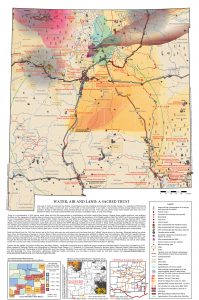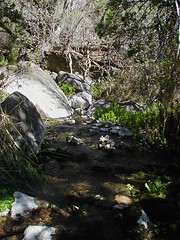Public Comments about Proposed Changes to New Mexico’s Water Protection Regulations Due Monday, October 17th – Sample Comments Available for Your Use
In September, the New Mexico Environment Department released its second attempt to eviscerate the public participation requirements provided in the New Mexico Ground and Surface Water Protection Regulations. https://www.env.nm.gov/gwb/ Comments are due to the Department on Monday, October 17th by 5 pm Mountain Daylight Time. Please submit them electronically to NMENV.GWQBrulerev@state.nm.us Sample public comments are available for your use at CCNS’s website at samplecommentltrnmwaterstds101716rev
Reducing public participation is clearly the goal of the Martinez administration. One glaring example was revealed in a November 2015 Department document entitled, “Hit [L]ist for Regulation Changes,” which was released to the New Mexico Environmental Law Center in response to their Inspection of Public Record Request. http://nuclearactive.org/wp-content/uploads/2016/08/GWQB-HIT-LIST-FOR-REGULATION-CHANGES.pdf Number One on the Hit List is to “figure how to further reduce [public notice and participation requirement] efforts.”
If a person wants to discharge a pollutant into water, the New Mexico Water Quality Act requires that they apply for a discharge permit. Recent requests for renewal of the five-year permits include the discharge of up to 7.5 million gallons per day of brine tailing water from a potash mine to a brine management area [Mosaic Potash Carlsbad, Inc., Discharge Permit No. 1399, Public Notice 1, published on August 26, 2016 at https://www.env.nm.gov/gwb/NMED-GWQB-PublicNotice.htm ] and 4.6 million gallons per day of treated water to the Red River [Chevron Questa Mine, Discharge Permit No. 1539, Public Notice 2, published on September 8, 2016 at https://www.env.nm.gov/gwb/NMED-GWQB-PublicNotice.htm ]. Requests for new permits or renewal of existing permits require public notice, opportunities for public review and comment of the draft permit, and an opportunity to request a public hearing.
In several cases, the Department is proposing to exceed its authority granted by the New Mexico Water Quality Act and the Water Quality Control Commission regulations. For example, despite the fact that the New Mexico Water Quality Act limits the Department to renewal or modification of a permit, the Department is proposing to “amend” a discharge permit with no requirements for public notice and participation. Proposed 20.6.2.7.D(4) NMAC. The Department also is proposing to allow a polluter to discharge a new pollutant without providing public notice and opportunities for participation. Proposed 20.6.2.7.D(4)(d) NMAC.
Further, the Department is proposing to double the concentration of chromium that may be released into the environment from 0.05 milligrams per liter (mg/L) to 0.1 mg/L. Proposed 20.6.2.3103.A(6) NMAC. The federal drinking water standard for chromium is 0.1 mg/L. The New Mexico Water Quality Act does not preclude New Mexico from having more protective drinking water standards than the federal standards. The federal standards are a floor, not a ceiling. The Commission clearly had good reason to set the chromium standards at the more protective 0.05 mg/L. The Department has not provided any justification for such a significant weakening of this standard.
Toxic chromium, at 24 times the current New Mexico standard, has been found in the regional drinking water aquifer below Los Alamos National Laboratory. It is migrating towards Pueblo de San Ildefonso. Doubling the standard would mean less cleanup of the regional drinking water aquifer.
In order to change the regulations, the New Mexico Water Quality Control Commission must hold a public hearing, which is planned for next spring.
On the positive site, the Department is proposing to increase permitting fees for many dischargers. The current fees for state discharge permit applications are outrageous low and do not begin to cover the cost to the state’s taxpayers of issuing, monitoring and enforcing state discharge permits. The proposed fee increases are long overdue. If approved by the Commission, an annual review would be conducted and the fees adjusted to the consumer price index. Proposed 20.6.2.3114 NMAC.
The Department is also proposing to strengthen many state standards to the more protective federal standards. The Department should be encouraged to maintain these proposed changes in the final proposal.
Tags: ground and surface water protection, water protection regulations
















Comments
No comments so far.